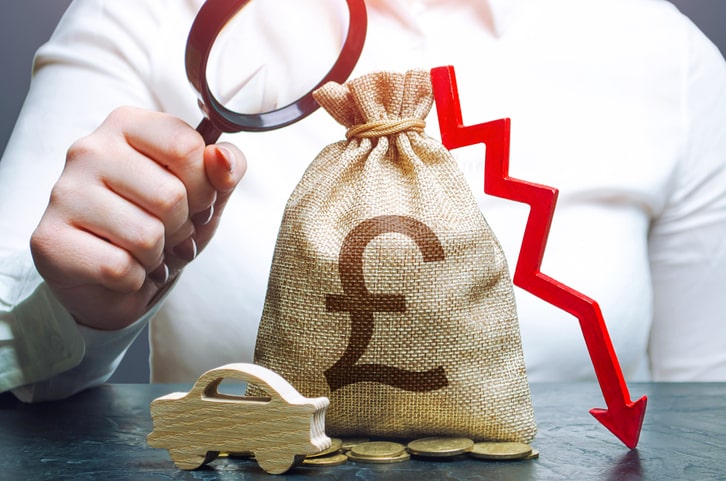How Does Bankruptcy Affect Your Credit Score?
Financial challenges can be overwhelming, and sometimes, individuals consider bankruptcy as a way to regain control. However, the decision to file for bankruptcy is a significant one with lasting consequences. One of the primary concerns for those considering bankruptcy is its impact on their credit score. This guide explores how bankruptcy affects your credit score and practical ways to rebuild it post-bankruptcy.

What are Credit Scores?
A credit score is a numerical representation of your creditworthiness, ranging from 300 to 850. Higher scores indicate better creditworthiness and are crucial when applying for loans or credit cards. Here is a breakdown of how each type of bankruptcy affects your credit score.
Chapter 7 Bankruptcy
With the Chapter 7 bankruptcy, you will sell your non-exempt assets to settle your debts. While it provides a fresh start, it comes with consequences for your credit score. A Chapter 7 bankruptcy remains on your credit report for ten years, affecting your score significantly.
During the first few years after filing for Chapter 7, your credit score may experience a sharp decline. However, as time progresses, its impact lessens, especially if you adopt responsible financial habits. Lenders may consider your recent credit history more than the bankruptcy itself.
Chapter 13 Bankruptcy
With Chapter 13 bankruptcy, you are required to create a repayment plan to settle your debts over three to five years. Although the impact on your credit score is less severe compared to Chapter 7, it remains on your credit report for seven years.
During the repayment period, you may find it challenging to obtain new credit, and your score may decrease. However, as with Chapter 7, responsible financial behavior can help rebuild your credit over time.
Rebuilding Your Credit Post-Bankruptcy
Rebuilding your credit after bankruptcy is crucial for securing a stable financial future. Here are some practical steps to consider:
- Secured credit cards: These cards serve as a powerful tool for rebuilding credit after bankruptcy. They only need you to deposit cash, typically equal to the credit limit. This deposit minimizes the risk for lenders and makes it easier for individuals with a bankruptcy history to qualify. To maximize the positive impact on your credit score, it is essential to use the secured card responsibly. Make small, regular purchases and ensure that you pay the balance in full and on time each month. Timely payments demonstrate to creditors and credit bureaus that you are managing credit responsibly, gradually improving your creditworthiness.
- Timely payments: Consistent and timely payments are paramount in rebuilding your credit post-bankruptcy. Paying bills, rent, utilities, and any remaining debts not discharged in bankruptcy on time is crucial. Late payments can have a detrimental effect on your credit score, so establishing a track record of reliability is key. Create automated payments or use reminders to ensure you never miss a due date. You should also consider creating a budget to manage your finances effectively. Demonstrating financial responsibility over time will contribute positively to your credit score.
- Budgeting: Crafting a realistic and sustainable budget is fundamental to rebuilding your financial health. Evaluate your income, expenses, and debts to create a comprehensive budget that allows you to meet your financial obligations and gradually save money. Identify areas where you can cut unnecessary expenses and redirect funds towards debt repayment or savings. A well-thought-out budget helps you avoid accumulating new debts and provides a roadmap for achieving financial stability.
- Credit monitoring: Regularly monitoring your credit report is essential during the post-bankruptcy rebuilding phase. Obtain free annual credit reports from the major credit bureaus and review them for accuracy. Scrutinize the reports for any errors, inaccuracies, or fraudulent activity. If necessary, dispute any discrepancies promptly to ensure your credit report reflects your financial status. Monitoring your credit allows you to track your progress, identify areas for improvement, and address any issues that may arise.
Fight Bankruptcy With a Professional Attorney By Your Side
Bankruptcy does have a significant impact on your credit score, but it is not the end of your financial journey. With time and responsible financial habits, you can rebuild your credit and work towards a more secure financial future.
If you find yourself facing the complexities of bankruptcy, seeking legal advice is crucial. The experienced professionals at Eric Ollason Attorney at Law can guide you through the process, offering support and expertise to get through bankruptcy comfortably. All you have to do is contact us and take the first step towards regaining control of your financial well-being.





